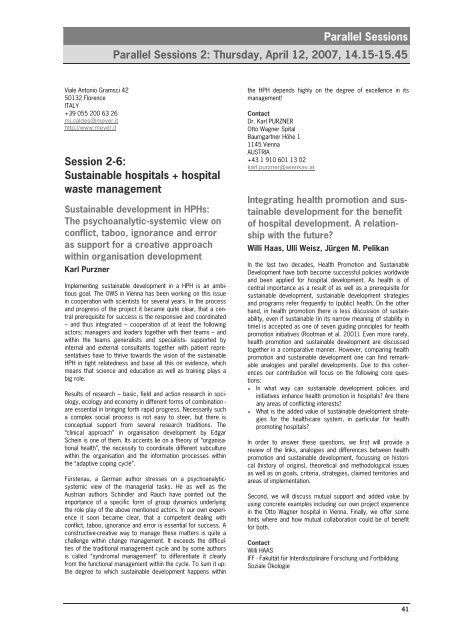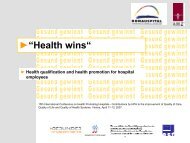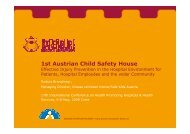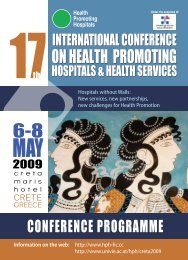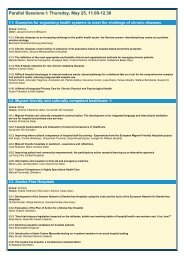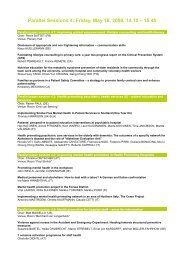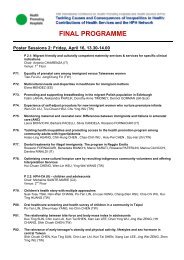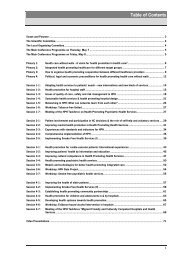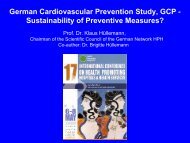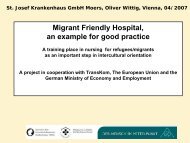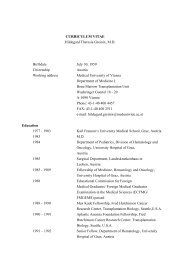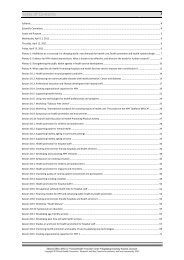Plenary 1: The Hospital – A Staff Empowering ... - HPH-Conference
Plenary 1: The Hospital – A Staff Empowering ... - HPH-Conference
Plenary 1: The Hospital – A Staff Empowering ... - HPH-Conference
You also want an ePaper? Increase the reach of your titles
YUMPU automatically turns print PDFs into web optimized ePapers that Google loves.
Viale Antonio Gramsci 42<br />
50132 Florence<br />
ITALY<br />
+39 055 200 63 26<br />
mj.caldes@meyer.it<br />
http://www.meyer.it<br />
Parallel Sessions<br />
Parallel Sessions 2: Thursday, April 12, 2007, 14.15-15.45<br />
Session 2-6:<br />
Sustainable hospitals + hospital<br />
waste management<br />
Sustainable development in <strong>HPH</strong>s:<br />
<strong>The</strong> psychoanalytic-systemic view on<br />
conflict, taboo, ignorance and error<br />
as support for a creative approach<br />
within organisation development<br />
Karl Purzner<br />
Implementing sustainable development in a <strong>HPH</strong> is an ambitious<br />
goal. <strong>The</strong> OWS in Vienna has been working on this issue<br />
in cooperation with scientists for several years. In the process<br />
and progress of the project it became quite clear, that a central<br />
prerequisite for success is the responsive and coordinated<br />
<strong>–</strong> and thus integrated <strong>–</strong> cooperation of at least the following<br />
actors: managers and leaders together with their teams <strong>–</strong> and<br />
within the teams generalists and specialists- supported by<br />
internal and external consultants together with patient representatives<br />
have to thrive towards the vision of the sustainable<br />
<strong>HPH</strong> in tight relatedness and base all this on evidence, which<br />
means that science and education as well as training plays a<br />
big role.<br />
Results of research <strong>–</strong> basic, field and action research in sociology,<br />
ecology and economy in different forms of combination -<br />
are essential in bringing forth rapid progress. Necessarily such<br />
a complex social process is not easy to steer, but there is<br />
conceptual support from several research traditions. <strong>The</strong><br />
“clinical approach” in organisation development by Edgar<br />
Schein is one of them. Its accents lie on a theory of “organisational<br />
health”, the necessity to coordinate different subculture<br />
within the organisation and the information processes within<br />
the “adaptive coping cycle”.<br />
Fürstenau, a German author stresses on a psychoanalyticsystemic<br />
view of the managerial tasks. He as well as the<br />
Austrian authors Schindler and Rauch have pointed out the<br />
importance of a specific form of group dynamics underlying<br />
the role play of the above mentioned actors. In our own experience<br />
it soon became clear, that a competent dealing with<br />
conflict, taboo, ignorance and error is essential for success. A<br />
constructive-creative way to manage these matters is quite a<br />
challenge within change management. It exceeds the difficulties<br />
of the traditional management cycle and by some authors<br />
is called “syndromal management” to differentiate it clearly<br />
from the functional management within the cycle. To sum it up:<br />
the degree to which sustainable development happens within<br />
the <strong>HPH</strong> depends highly on the degree of excellence in its<br />
management!<br />
Contact<br />
Dr. Karl PURZNER<br />
Otto Wagner Spital<br />
Baumgartner Höhe 1<br />
1145 Vienna<br />
AUSTRIA<br />
+43 1 910 601 13 02<br />
karl.purzner@wienkav.at<br />
Integrating health promotion and sustainable<br />
development for the benefit<br />
of hospital development. A relationship<br />
with the future?<br />
Willi Haas, Ulli Weisz, Jürgen M. Pelikan<br />
In the last two decades, Health Promotion and Sustainable<br />
Development have both become successful policies worldwide<br />
and been applied for hospital development. As health is of<br />
central importance as a result of as well as a prerequisite for<br />
sustainable development, sustainable development strategies<br />
and programs refer frequently to (public) health. On the other<br />
hand, in health promotion there is less discussion of sustainability,<br />
even if sustainable (in its narrow meaning of stability in<br />
time) is accepted as one of seven guiding principles for health<br />
promotion initiatives (Rootman et al. 2001). Even more rarely,<br />
health promotion and sustainable development are discussed<br />
together in a comparative manner. However, comparing health<br />
promotion and sustainable development one can find remarkable<br />
analogies and parallel developments. Due to this coherences<br />
our contribution will focus on the following core questions:<br />
� In what way can sustainable development policies and<br />
initiatives enhance health promotion in hospitals? Are there<br />
any areas of conflicting interests?<br />
� What is the added value of sustainable development strategies<br />
for the health-care system, in particular for health<br />
promoting hospitals?<br />
In order to answer these questions, we first will provide a<br />
review of the links, analogies and differences between health<br />
promotion and sustainable development, focussing on historical<br />
(history of origins), theoretical and methodological issues<br />
as well as on goals, criteria, strategies, claimed territories and<br />
areas of implementation.<br />
Second, we will discuss mutual support and added value by<br />
using concrete examples including our own project experience<br />
in the Otto Wagner hospital in Vienna. Finally, we offer some<br />
hints where and how mutual collaboration could be of benefit<br />
for both.<br />
Contact<br />
Willi HAAS<br />
IFF - Fakultät für Interdisziplinäre Forschung und Fortbildung<br />
Soziale Ökologie<br />
41


